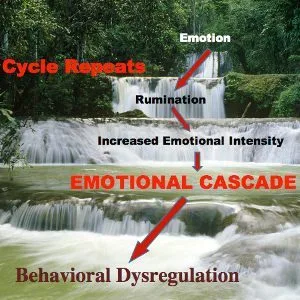Edward Selby, Ph.D. in Clinical Psychology
Francesca Martino, Cognitive Psychologist
“I’ve always felt these things. I don’t think there are any words that describe them exactly, but they are a combination of rage, anger, extreme pain. They mix together into what I call the Fury… I am starting to learn how to deal with it, but until recently, the only way I knew was through drinking and drugs. I took
something, whatever it was, and if I took enough of it, the Fury would subside. The problem was that it would always come back, usually stronger, and that would require more and stronger substances to kill it, and that was always the goal, to kill it”
– James Frey, A Million Little Pieces

Emotion dysregulation in BPD may then be a result of an intense use of rumination. Yet the tendency to ruminate on negative emotions increases them, which in turn increase levels of rumination, leading to a vicious and repetitive cycle, which is called an Emotional Cascade.
READ ALL ENGLISH ARTICLES
Borderline personality disorder (BPD) is characterized by patterns of intense and negative emotions, interpersonal difficulties, and maladaptive impulsive behaviors. Emotional dysregulation and behavioral dyscontrol are central features of BPD (Linehan, 1993).
Emotional dysregulation includes intense emotional reactivity and sensitivity to stimuli, and slow return to emotional baseline. Research suggests that emotional instability may drive behavioral dyscontrol in BPD, including self-harm, aggression, substance use or binge eating. Although current research provides preliminary evidence for this model, specific mechanisms that cause emotion dysregulation and incite impulsive behaviors in BPD are still unclear.

Recently, the Emotional Cascade Model (ECM; Selby et al. 2008; 2009) has provided incremental understanding of BPD, especially with regard to the relationship between emotional and behavioral dysregulation. According to the ECM, rumination could play a central role in increasing negative emotions and in enhancing behavioral dyscontrol. In detail, when people with BPD experience negative emotions they may automatically start to ruminate on them, with the intention of regulating such negative and unpleasant emotionality.
It is already known that rumination is a maladaptive cognitive strategy to regulate affects and consist of thinking repetitively about the causes and consequences of negative emotional experience (Nolen-Hoeksema, 1991). Even though rumination has been demonstrated to increase negative emotions instead of reduce it, many people continue to do it because they believe, incorrectly, that re-thinking about events will increase their understanding of the situation and aid in problem-solving (Papageorgiou, 2001).
Emotion dysregulation in BPD may then be a result of an intense use of rumination. Yet the tendency to ruminate on negative emotions increases them, which in turn increase levels of rumination, leading to a vicious and repetitive cycle, which is called an Emotional Cascade.
In order to ‘‘break-up’’ this loop, an individual may engage in behavior that distracts him/her from emotional thoughts. These behaviors may inhibit this cycle by allowing an individual to focus on the alternate physical and emotional stimuli associated with the behavior, such as taste or chewing in binge-eating, impulsive and aggressive actions toward someone, physical pain and sight of blood in self-harm. The results of engaging in one of these behaviors are effective in altering affect, even though the effects may only last for a short time, which explains why many of these behaviors may become habitual. Following the behavior, individuals may experience another rumination cycle until later, resulting from shame or guilt for engaging in previous dyscontrolled behaviors (as in binging and purging).
The ECM has previously been studied in students with BPD traits (Selby et al 2008, 2009, 2012). In a cross sectional study, findings showed that general rumination (depressive and angry) was the mediator between negative emotions and behaviors, confirming its central role in leading impulsive and dyscrontrolled actions when people with BPD traits experience unpleasant feelings. Moreover, in a longitudinal study, high levels of negative emotions and rumination have been found to predict impulsive behaviors after few hours from the events.
In conclusion, the ECM have been confirmed in healthy samples. Even dough maladaptive cognitive strategies to regulate emotions, such as rumination, have been found in BPD (Baer et al. 2011), their implication in behavioural dyscontrol still need to be proved in clinical population. Actually, in Italy a research aimed to investigate the ECM in BPD has been conducting.
REFERENCES:
- Baer RA, Sauer SE. (2011). Relationships between depressive rumination, anger rumination, and borderline personality features. Personal Disord.;2(2):142-50.
- Linehan MM. Cognitive Behavioral Treatment of Borderline Personality Disorder. New York: Guilford Press, 1993.
- Nolen-Hoeksema, S. (1991). Responses to depression and their effects on the duration of depressive episodes. Journal of Abnormal Psychology, 100, 569-582.
- Papageorgiou C, Wells A. Positive beliefs about depressive rumination: development and preliminary validation of a self-report scale. Behavior Therapy 2001;32:13–26.
- Selby, E.A., Anestis, M.D., & Joiner, T.E.. (2008). Understanding the relationship between emotional and behavioral dysregulation: Emotional cascades. Behaviour Research and Therapy, 46, 593-611.
- Selby, E.A., & Joiner, T.E. (2009). Cascades of emotion: The emergence of borderline personality disorder from emotional and behavioral dysregulation. Review of General Psychology, 13, 219-229.
- Selby, E. A., Anestis, M. D., Bender, T., & Joiner, T. E., Jr. (2009). An exploration of the emotional cascade model in borderline personality disorder. Journal of Abnormal Psychology, 118, 375–387.
- Selby, E. A., & Joiner, T. E., Jr. (2012). Emotional Cascades as Prospective Predictors of Dysregulated Behaviors in Borderline Personality Disorder. Personality Disorders: Theory, Research, and Treatment. Advance online publication. doi: 10.1037/a0029933


